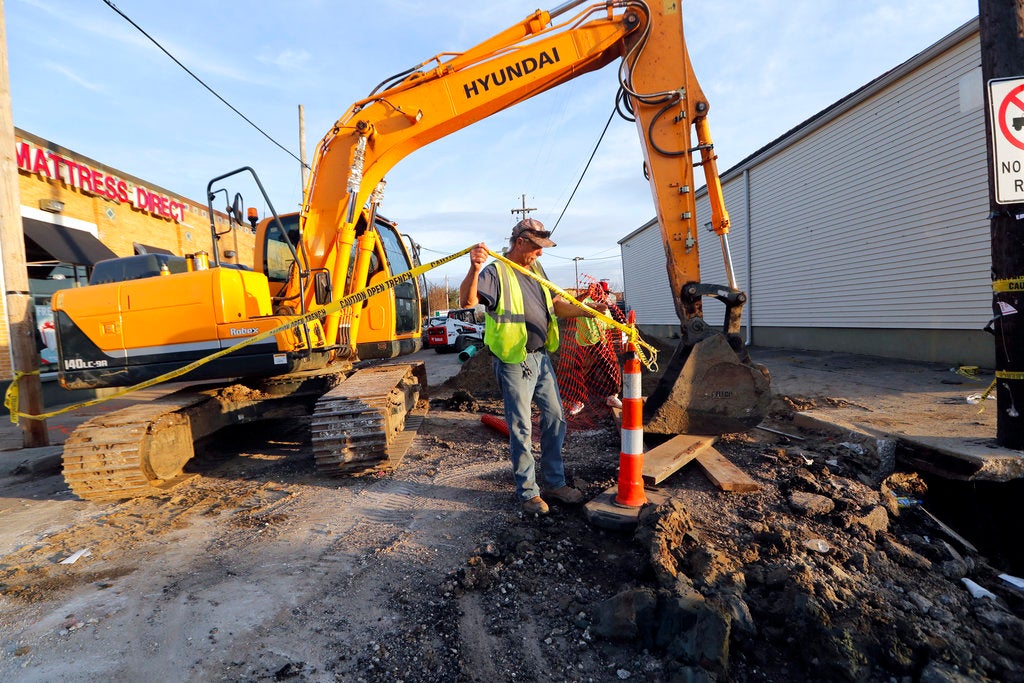Other Voices: $200 billion the government doesn’t have
Published 12:00 am Wednesday, February 28, 2018

- Workers fix a sewer main below the sidewalk in Mid City New Orleans, Wednesday, Jan. 31, 2018. The city of New Orleans is perhaps one of the best examples of what President Donald Trump calls the country’s “crumbling infrastructure.” City officials say New Orleans needs more than $11 billion to update key parts of its infrastructure. The city has about $2 billion in hand. (AP Photo/Gerald Herbert)
With the federal budget on track to hit deficits of $1 trillion a year, President Trump’s long-awaited $1.5 trillion infrastructure proposal was finally released.
A core focus of Trump on the campaign trail, the proposal certainly contains some important ideas, but it comes at a time when neither the Trump administration nor congressional leadership have shown any great interest in balancing the federal budget.
A White House budget proposal calling for $4.4 trillion of federal spending for the 2019 fiscal year against $3.2 trillion of revenues underscores just how much work there is to right the fiscal trajectory of the federal government before going on lavish spending sprees.
To his credit, the Trump plan doesn’t call for $1.5 trillion in direct federal spending. Predicated on the notion that state and local governments best know the infrastructure needs of their communities, the plan calls for $200 billion in federal spending over the next decade.
Under the plan, the $200 billion would be used to leverage the additional $1.3 billion in funding from non-federal sources like states, localities and the private sector. To do this, the $200 billion in federal spending would mostly be turned into grants and matching funds to encourage local projects and funding.
While the recognition that local governments best know their local infrastructure needs is a prudent one, it isn’t clear that doling out $200 billion in federal funds across the country over the next decade is especially necessary.
After all, state and local jurisdictions are capable of raising their own funds to address their respective infrastructure problems. If the idea is to empower states and localities to mostly take on and finance infrastructure improvements anyway, it isn’t obvious that $200 billion in federal funds will make all the difference.
It’s also $200 billion the federal government doesn’t have. Perhaps this is why President Trump, according to Sen. Tom Carper, D-Delaware, is open to backing a 25-cent federal gasoline tax increase. On top of the existing federal gas tax of 18.4 cents, it’s difficult to imagine many Republicans getting behind a federal gas tax of 43.4 cents per gallon.
Word of that particular idea drew immediate opposition by, founder and president of Americans for Tax Reform. “The problem is not that the gas tax is too low,” he said. “The problem is that gas tax revenue is siphoned off to pay for projects unrelated to roads and bridges.”
But perhaps beyond the actual spending and taxing proposals being discussed, the White House’s infrastructure plan does suggest ideas for speeding up infrastructure projects. The proposal calls for an environmental review system that would assign one agency the responsibility for the reviews, a move that the plan suggests could cut down the permitting process to two years or less.
Regardless of whether Trump gets his way on the idea of greater federal spending on infrastructure, removing excessive barriers should always be a goal.
Taken together, while there are some principles and ideas in Trump’s plan worth considering, the idea of going on another federal spending spree while deficits continue to grow is incompatible with the sort of fiscal conservatism Republicans at least claim to support.
— Orange County Register


